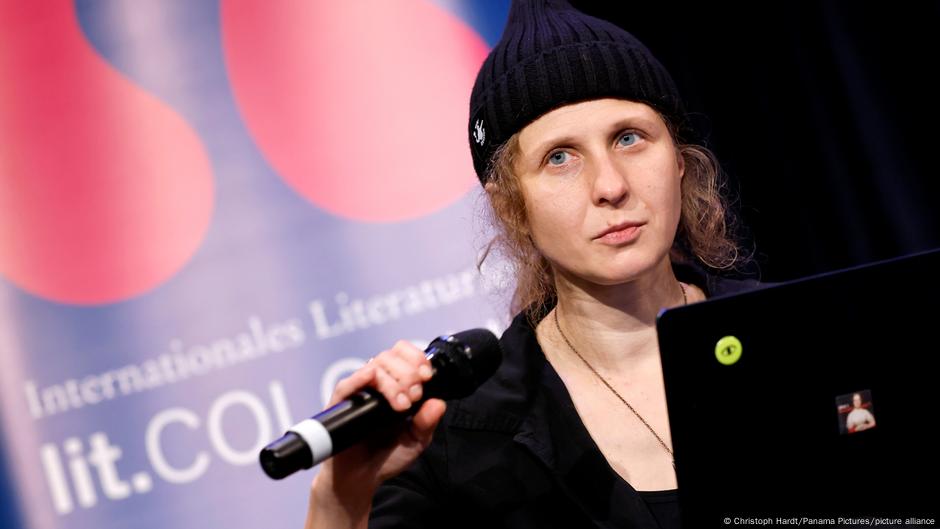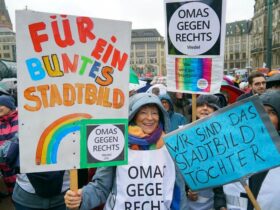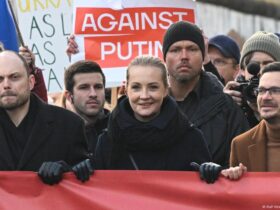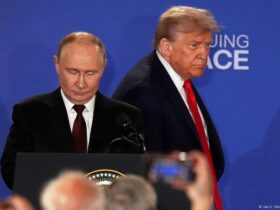She sits on stage wearing black, smoking an e-cigarette, her blonde, curly hair flowing down from her thick hat. The indefatigable Maria Alyokhina, the 37-year-old activist and performance artist best known as a member of Pussy Riot, is presenting her new book “Political Girl: Life and Fate in Russia” as part of the literary festival Lit.Cologne in Cologne.
Maria Alyokhina was one of several women who protested the evening before Vladimir Putin was re-elected president of Russia – a position he still holds today. That night, the group wore colorful clothes and masks and performed a “punk prayer” in front of the altar of Moscow’s Cathedral of Christ the Savior, calling on the Virgin Mary to “throw out” Putin. Pussy Riot’s act of resistance attracted worldwide attention.
However, the Virgin Mary did not hear his prayers – Putin has not gone anywhere. The once benevolent dictator has now turned into a full-fledged dictator. Maria Alyokhina had to flee Russia like thousands of other young Russians, including many artists. Alyokhina now holds an Icelandic passport and leads a nomadic lifestyle in the West.
Sonia Mikich, a longtime Russia correspondent for the German broadcaster ARD and presenter at the book launch in Cologne, praised Maria – “Mascha” – Alyokhina, calling her a kind of emissary from a different Russia – “the radical, absurd, artistic, independent country that we loved so much” and which now lives only outside Putin’s circle.
Alyokhina: ‘Detention conditions got worse’
Maria Alyokhina, along with her fellow Pussy Riot member Olga Borisova, wrote a 500-page book detailing the events that took place between December 2013 and April 2022. “From the moment I left the prison colony to the moment I had to leave Russia absolutely reluctantly,” explains Alyokhina.
Maria Alyokhina and other Pussy Riot members were sentenced to two years in a prison colony following their protest at the Cathedral of Christ the Savior, which, looking back on them, almost seems like a walk in the park. She explains, “We were constantly in the international headlines, we received thousands of letters from supporters, and most importantly, there was no longer this brutal, murderous war going on.” She says that today the condition of many political prisoners is very bad.
eight years of conflict in russia
At the end of 2013, Alyokhina was released early from prison and returned home accompanied by a crowd of journalists. But in the years that followed, authorities escalated violence – especially against Russian citizens. The violence culminated in Russia’s full-scale invasion of Ukraine in 2022 and the assassination of opposition leader Alexei Navalny.
Alyokhina fought for eight turbulent years – until early 2022. She participated in events critical of the government, was repeatedly subjected to state violence, and was repeatedly imprisoned and placed under house arrest. Finally, she freed herself from her electronic ankle bracelet and fled westward through Belarus and Lithuania disguised as a food delivery courier, leaving her phone behind as a decoy.
Maria Alyokhina was recently sentenced in her absence to 13 years and 15 days in prison for participating in an anti-war video titled “Mama, Don’t Believe the TV” and for other actions that spread misinformation or defamed the Russian armed forces. In his words, “It means they haven’t forgotten me.” The severity of the sentence underscores the scale of retaliation against dissent in Russia.
a story of freedom
Her book, “Political Girl”, tells stories of the author’s courageous and sometimes humorous actions – such as replacing red flags with rainbow flags on five government buildings in Moscow in protest of the persecution of the LGBTQ community in Russia. The reader accompanies Alyokhina on wild trips across the country, during arrests and attacks by right-wing thugs. During the chapters readers also get to know a more personal side of the author in which she talks about her relationship with her son Philip. At 18, he is now the same age his mother was when she gave birth to him.
The stories paint a multifaceted picture of Russia – a morbid, sometimes cruel, but not hopeless country. Because, as Alyokhina says, there are still courageous, warm-hearted people – she has met them everywhere.
weapons for ukraine
Maria Alyokhina has clear words when it comes to feelings in Europe about the war in Ukraine. “There are these far-left voices in Germany that are, in my opinion, very hypocritical,” she says in an interview with DW on the sidelines of her reading in Cologne. “Because when you demand that Ukraine give up its occupied territories and sign so-called ‘peace agreements,’ everyone fighting against Putin’s regime in Russia knows that anything can be signed and [the Russian government] You may be pressurized later also.”
Alyokhina says she is “definitely in favor of arms deliveries to Ukraine.” Now in the fourth year of the war, talking about “peace without weapons”, while hundreds of thousands of Ukrainians have sacrificed their lives for their country’s survival, is simply “stupid and cowardly”, the activist says.
‘Resistance is always possible’
Along with other Kremlin critics such as Galina Starovoitova, Anna Politkovskaya and Alexei Navalny, Maria Alyokhina offers an example of how resistance is possible – even under the most extreme circumstances. “We do not choose the country where we are born, but we choose how we want to live our lives,” Alyokhina said during a reading in Cologne. In her book, she shows readers the horrific reality of Russia – a reality where young girls are sent to prison for a joke, a famous opposition figure is murdered, and doctors, journalists, and poets are prosecuted for providing “fake news” about the war in Ukraine. Is she afraid? Alyokhina answers: “At the moment, I am somehow ashamed to be afraid.”
This article was translated from German






Leave a Reply